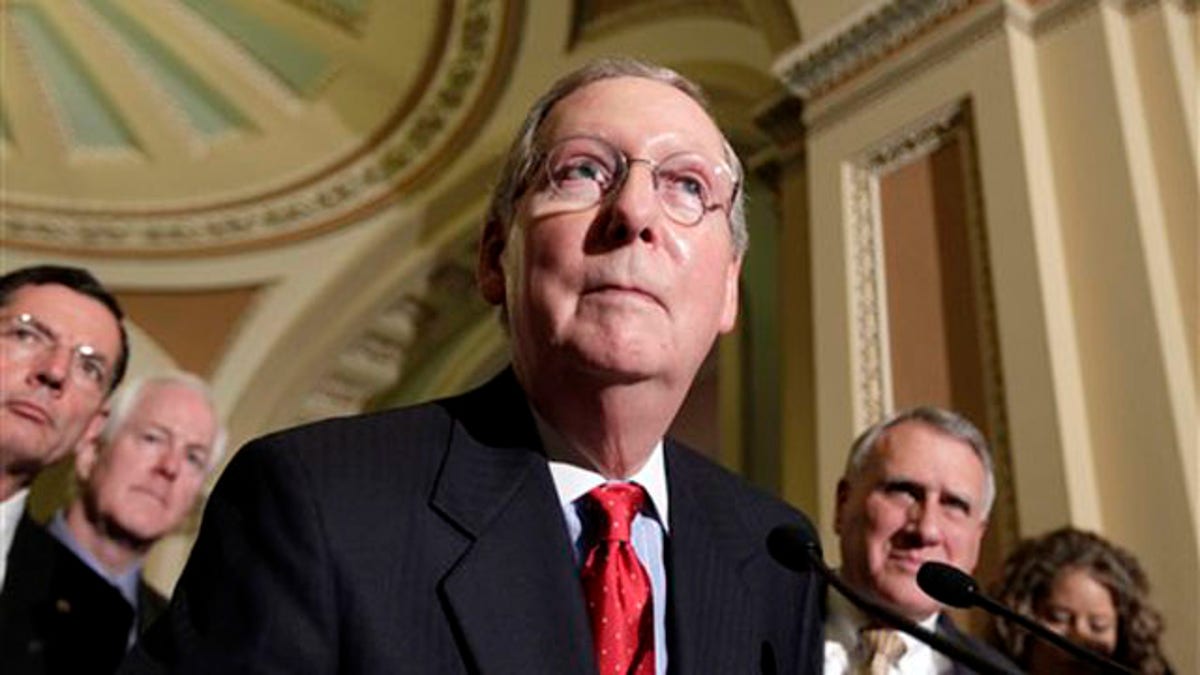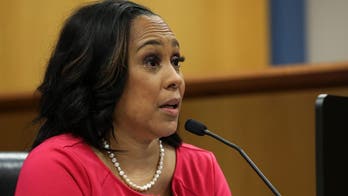
Senate Minority Leader Mitch McConnell speaks with reporters following a weekly Republican policy luncheon June 28 on Capitol Hill. (AP)
The Senate has penciled in extra time to work out a budget deal ahead of an Aug. 2 deadline, but rather than move toward the middle both sides are digging in hard on their conditions for deficit reduction.
The tension threatens to keep offline negotiations that fell apart last week when Republican negotiators walked out. GOP lawmakers want major spending cuts as part of any agreement to raise the debt ceiling -- something the Obama administration says must happen by the August deadline to avoid the risk of default -- and left the talks out of concern that Democrats were pushing too hard for tax hikes.
But while Democrats say they're willing to accept some spending cuts, President Obama made clear during his press conference Wednesday that he will continue to push for tax increases as part of a deal.
The Senate acceded to one presidential demand Thursday -- the chamber canceled its July Fourth recess and prepared to come back into session starting Tuesday, after Obama complained that Congress was not working as hard as he was.
But there was no indication the two sides had progressed in resolving their chief disagreement.
When Senate Minority Leader Mitch McConnell, R-Ky., invited Obama to meet with GOP lawmakers at the Capitol on Thursday afternoon, the White House pushed back.
Not only was Obama heading to Philadelphia Thursday to attend Democratic fundraising events, White House Press Secretary Jay Carney dismissed McConnell's invitation, saying he had merely "invited the president to hear what would not pass. That's not a conversation worth having."
Later, at a donor's home, Obama reiterated his call for spending cuts and new tax revenues.
"The truth is you could figure out on the back of a napkin how to get this thing done," he said. "The question is one of political will."
Lawmakers might not even have as much time to reach a deal as the administration lets on. One Democratic official with knowledge of the debt talks says a deal is needed in the next two to three weeks to allow time for procedural hurdles.
"If the markets start to react, then we've waited a day too long," the official told Fox News, noting that the GOP-led House has a three-day rule for passing bills.
This official said a deal is needed by July 22, nearly two weeks earlier than the Treasury deadline, though some on Capitol Hill have called the Treasury's date a scare tactic to push a deal.
Treasury Secretary Tim Geithner has extended the deadline three times in the past.
The stakes of the debate were underscored when a Standard & Poor's executive said the credit-rating agency would give the government its lowest rating should lawmakers fail to agree on raising the borrowing limit and cause a federal default.
Should that occur, S&P would drop the U.S. rating of AAA to D, John Chambers, managing director of sovereign ratings for the company, said on Bloomberg Television.
Obama has said that in talks, Republican and Democratic negotiators have found more than $1 trillion in potential spending cuts over the coming decade, including reductions favored by both sides.
The White House is also proposing about $400 billion in higher tax revenues. Republicans want no tax increases and deeper spending cuts than Democrats have proposed.
Increasing the current borrowing limit by about $2.4 trillion would carry the government until the end of 2012 -- thereby avoiding another congressional vote on the issue until after the next presidential and congressional elections. Republicans have insisted on coupling any extension with at least an equal amount of budget savings.
The Associated Press contributed to this report.




